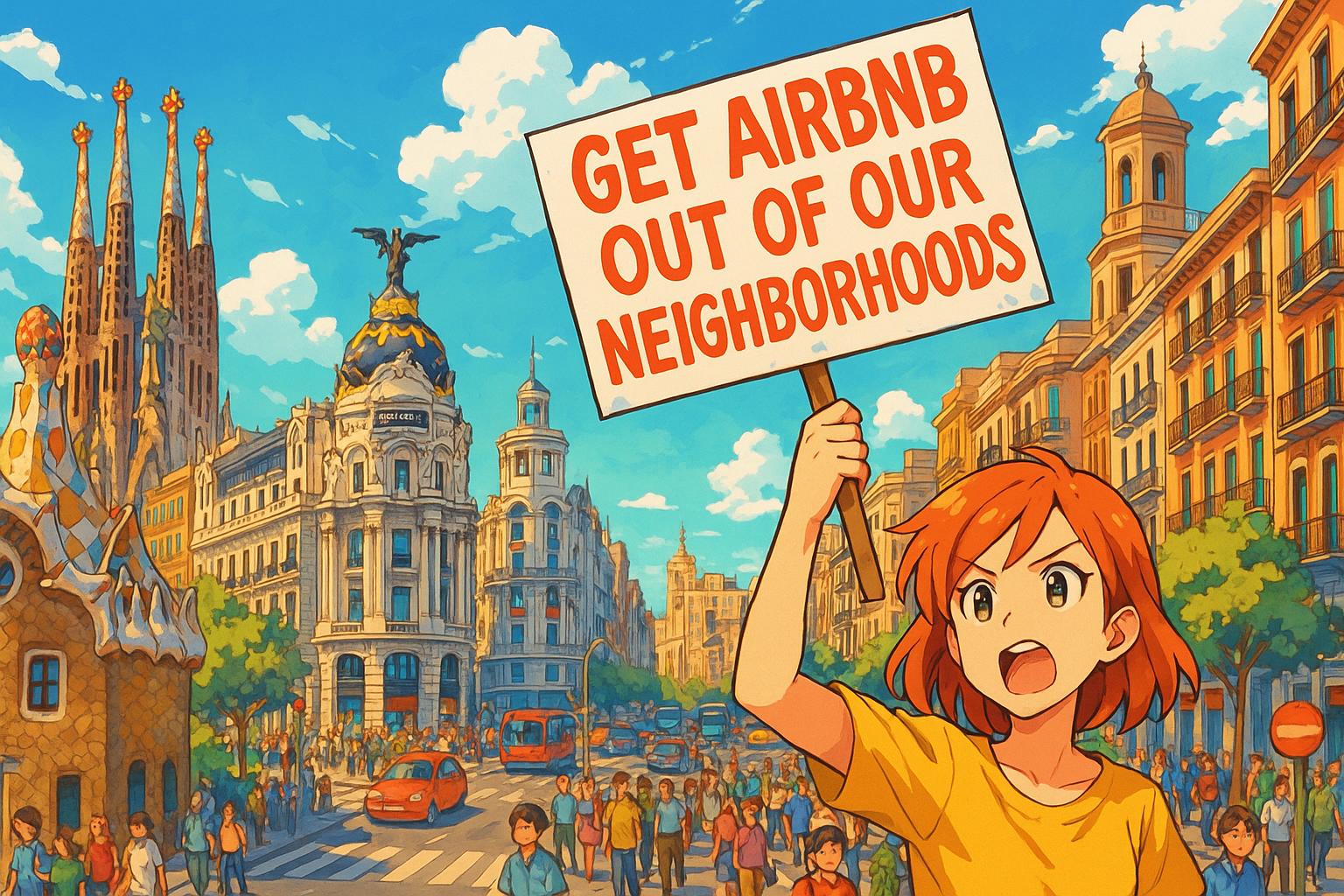The Spanish government has ordered the removal of nearly 66,000 Airbnb listings to combat rising housing costs and overtourism, amid mounting protests and proposals for radical reforms in major cities like Barcelona and Madrid.
The Spanish government has recently ramped up its scrutiny of Airbnb, ordering the company to remove nearly 66,000 short-term rental listings that allegedly flout local laws. This decisive action underscores a growing recognition among officials that the surge in short-term holiday rentals has directly contributed to escalating housing affordability issues, particularly in major cities like Madrid and Barcelona. Consumer Rights Minister Pablo Bustinduy explained that while there are numerous factors at play, the correlation between the rise of platforms like Airbnb and increasing rental costs is undeniable.
In a revealing statement, Bustinduy noted, “Obviously there is a correlation between these two facts. It’s not a linear relation… but it is obviously one of the elements that is contributing.” This perspective aligns with a recent report from the Bank of Spain, which highlighted a shortfall of 450,000 homes nationwide. In popular tourist areas such as the Canary and Balearic Islands, approximately half of the available housing stock is comprised of tourist accommodations or properties owned by non-residents. Such data lends weight to the argument that unchecked tourism is imposing significant strain on local housing markets.
Spain, a country that welcomed a record 94 million international visitors last year, is grappling with increasingly vocal public sentiment against mass tourism. Protests have erupted nationwide, with demonstrators demanding government action to safeguard housing rights. Signs bearing messages like “Get Airbnb out of our neighborhoods” were ubiquitous during a recent march in Madrid, indicating a public yearning for a balanced approach to tourism and residential housing.
Beneath the surface of these protests lies a broader socio-economic discontent. Many neighborhoods have become stark reminders of the impacts of overtourism, transforming vibrant local cultures into mere backdrops for tourist activity. International media reports have described Spanish cities as having morphed into ‘theme parks’, with locals calling for urgent measures to mitigate these effects. Bustinduy has reaffirmed the government’s commitment to ensuring that tourism does not infringe upon residents’ constitutional rights, explicitly mentioning the right to housing and well-being.
To that end, Barcelona has proposed a radical plan to phase out all licensed short-term rental apartments by 2028, in a bid to reclaim housing for full-time residents. While Airbnb has announced its intention to appeal the order to remove listings, it stresses that the platform merely facilitates connections between property owners and renters, absolving itself of direct oversight responsibilities. However, this stance has not quelled criticism from officials who insist that accountability must extend to platforms facilitating such transactions.
Another layer to the ongoing discourse is Spain’s exploration of further measures, such as levying a tax on properties held by non-EU citizens, aimed at curtailing the inflationary pressures exerted by foreign investment in the housing market. This proposal is part of a wider push by Prime Minister Pedro Sánchez’s government to enact substantial reforms addressing the housing crisis and ensuring greater access to affordable homes.
Bustinduy, a member of the left-wing Sumar party, dismissed fears that stringent regulations might deter tourists, arguing instead that they could promote a more responsible form of tourism, encouraging longer stays and protecting the cultural fabric that draws visitors to Spain. He pointed to recent actions against budget airlines as part of a broader strategy to uphold consumer rights and ensure that corporations adapt their business practices in line with community regulations.
As the government faces mounting pressure to reconcile the interests of residents with the economic benefits of tourism, the situation in Spain serves as a significant case study in the complexities arising from mass tourism. With concerted public and political challenges to the status quo gaining momentum, it remains to be seen how effective these reforms will be in striking a lasting balance.
 Reference Map:
Reference Map:
- Paragraph 1 – [1], [2]
- Paragraph 2 – [3], [4]
- Paragraph 3 – [5], [6]
- Paragraph 4 – [1], [5]
- Paragraph 5 – [4], [7]
- Paragraph 6 – [1], [3]
- Paragraph 7 – [2], [3]
Source: Noah Wire Services
- https://www.independent.co.uk/travel/news-and-advice/spain-barcelona-tourist-protest-airbnb-b2763424.html – Please view link – unable to able to access data
- https://apnews.com/article/9bd28bb6f3f705b62828880fb08bdf1a – The Spanish government has intensified its oversight of Airbnb, instructing the platform to remove nearly 66,000 holiday rentals that violated local regulations, such as lacking license numbers or accurate owner information. This action aims to mitigate the impact of short-term rentals on housing accessibility, particularly in cities like Madrid and Barcelona, where rental prices have significantly increased. Consumer Rights Minister Pablo Bustinduy acknowledged a correlation between the rise of platforms like Airbnb and escalating housing costs, though he noted other contributing factors. A Bank of Spain report highlighted a deficit of 450,000 homes, with tourist areas like the Canary and Balearic Islands facing severe shortages. Additionally, widespread protests have erupted, demanding more robust government intervention in the housing sector. Locally, Barcelona plans to eliminate all 10,000 licensed short-term rental apartments by 2028. The government emphasizes the need for sustainable tourism that does not infringe upon citizens’ constitutional rights, including the right to housing and well-being. Bustinduy also stressed the importance of holding large corporations accountable for adhering to democratically established regulations, regardless of their digital nature. He dismissed concerns that these measures might deter tourists, suggesting they would encourage longer stays, responsible tourism, and the preservation of Spain’s cultural and social fabric.
- https://cadenaser.com/nacional/2025/05/31/ciudades-convertidas-en-parques-tematicos-la-prensa-estadounidense-alerta-del-gran-problema-del-alojamiento-turistico-espanol-cadena-ser/ – Spain is grappling with a housing crisis exacerbated by mass tourism, with a record 98 million visitors in 2024, particularly impacting regions like the Balearic Islands, Valencian Community, and the Canary Islands. This surge has placed immense pressure on the housing market, making rentals unaffordable for local residents, especially in cities such as Madrid and Barcelona. International media, including CNN, have highlighted the transformation of Spanish cities into ‘theme parks’ and the adverse effects of the rise in tourist apartments. In response, the Spanish government has implemented stricter regulations, including the removal of 66,000 illegal Airbnb listings and proposals to impose a 21% VAT or taxes on vacant properties. Consumer Rights Minister Pablo Bustinduy emphasized the necessity for companies to adapt to existing laws, underscoring that housing should not be treated as a mere business model. Currently, there are approximately 400,000 tourist-use homes in Spain, with the rental crisis becoming a primary public concern, as reported by the CIS.
- https://apnews.com/article/bac46b236f0b151e1a38671191edcfc8 – Facing a significant housing affordability crisis, Spain plans to implement a 100% tax on properties purchased by non-EU citizens. This measure aims to address high rents and rising housing prices, particularly in cities like Madrid and Barcelona. The government’s goal is to provide more housing and better regulation. The rising costs of living and the impact of mass tourism have fueled public discontent and protests. The proposed tax targets non-EU buyers, often investing in high-end vacation homes, but it remains uncertain if this measure will gain parliamentary approval. Other proposals include building more public housing, imposing higher taxes on holiday rentals, and providing incentives for landlords offering affordable housing. The initiative is part of Prime Minister Pedro Sánchez’s broader efforts to address housing concerns in Spain, as mandated by the Spanish Constitution.
- https://time.com/6995756/barcelona-protesters-water-pistols-tourists/ – In Barcelona, thousands of residents protested against mass tourism by using water pistols to drench tourists in Las Ramblas and chanting ‘tourists go home.’ Protesters also cordoned off hotels and restaurants and displayed signs saying ‘tourism kills the city.’ The protests called for limiting tourism, claiming 19,600 participants compared to the police’s estimate of 2,800. The city’s Socialist mayor, Jaume Collboni, vowed to eliminate short-term rental properties and increase the tourist tax surcharge. The rise in tourism has led to increased expenses for the city and issues like lack of affordable housing. Similar protests have occurred across Spain, including demonstrations in the Canary Islands, Mallorca, and Málaga, where locals demanded action against overtourism and gentrification. Spain is considering a nationwide ban on tourist rentals within residential buildings to address these concerns. Other countries, such as the Netherlands and Greece, are also taking measures to control the impact of mass tourism.
- https://www.reuters.com/world/europe/thousands-protest-spains-canary-islands-over-mass-tourism-2024-04-20/ – In Tenerife, Spain’s Canary Islands, thousands protested demanding limits on tourist arrivals to address rising housing costs due to the boom in short-term holiday rentals and hotel construction. Demonstrators highlighted the detrimental impact of mass tourism on local housing and the environment, accounting for 35% of the region’s GDP. Organized by environmental groups, the protests occurred ahead of the peak holiday season, urging local authorities to curb visitor numbers and foreign property purchases. Canary Islands president Fernando Clavijo acknowledged the issue and emphasized the need for stricter controls. The archipelago, home to 2.2 million people, saw nearly 14 million foreign tourists in 2023, highlighting the pressure on infrastructure and resources.
- https://www.euronews.com/2025/04/05/thousands-in-spain-take-to-the-streets-in-protest-against-countrys-housing-crisis – Thousands of protesters have taken to the streets across 40 cities in Spain to demand solutions to what they have called the country’s worsening housing crisis. Organisers of the demonstrations—a collection of tenants’ rights, neighbourhood movements and other social rights groups—accuse the government of turning housing ‘into a business model.’ The mass protests mark a milestone as they are the first to be held simultaneously in many locations, a decade after the mass protests against evictions. Major streets across Spain, including the capital, Madrid, on Saturday turned orange and green—the distinctive colours of the movement. This demonstration comes after many months of talks; we wanted it to be decentralised, for everyone to come out at the same time and paralyse the state. The idea is that it will be the first day of a new wave of protests, one of the protesters said. Some of the demands of the protesters include the immediate lowering of rental prices with a reduction of up to 50%, the revamping of 3.8 million vacant homes, and the prohibition of evictions of vulnerable families. Sparked by protests in the Canary Islands, the mass mobilisation against the housing crisis first began last year in the Canary Islands, where residents took to the streets to demand a ‘sustainable’ tourism model and denounce the lack of housing solutions. ‘Housing has become a luxury within the reach of very few families,’ the Tenerife Tenants’ Union said. Subsequently, the initiative was supported by Malaga with its slogan, ‘Malaga to live, not to survive,’ It was then followed by Madrid, Barcelona, Valencia, and Bilbao, among other cities. According to Spain’s tenants’ associations and collectives, the housing situation has reached critical levels, with rents reported to have increased by more than 18% in the last two years. In some touristic areas, such as Ibiza, rental prices in many cases exceed 100% of the usual salary, while in others, such as Cáceres, ‘rents have risen last year by 17% in the city and by 27% at the provincial level.













